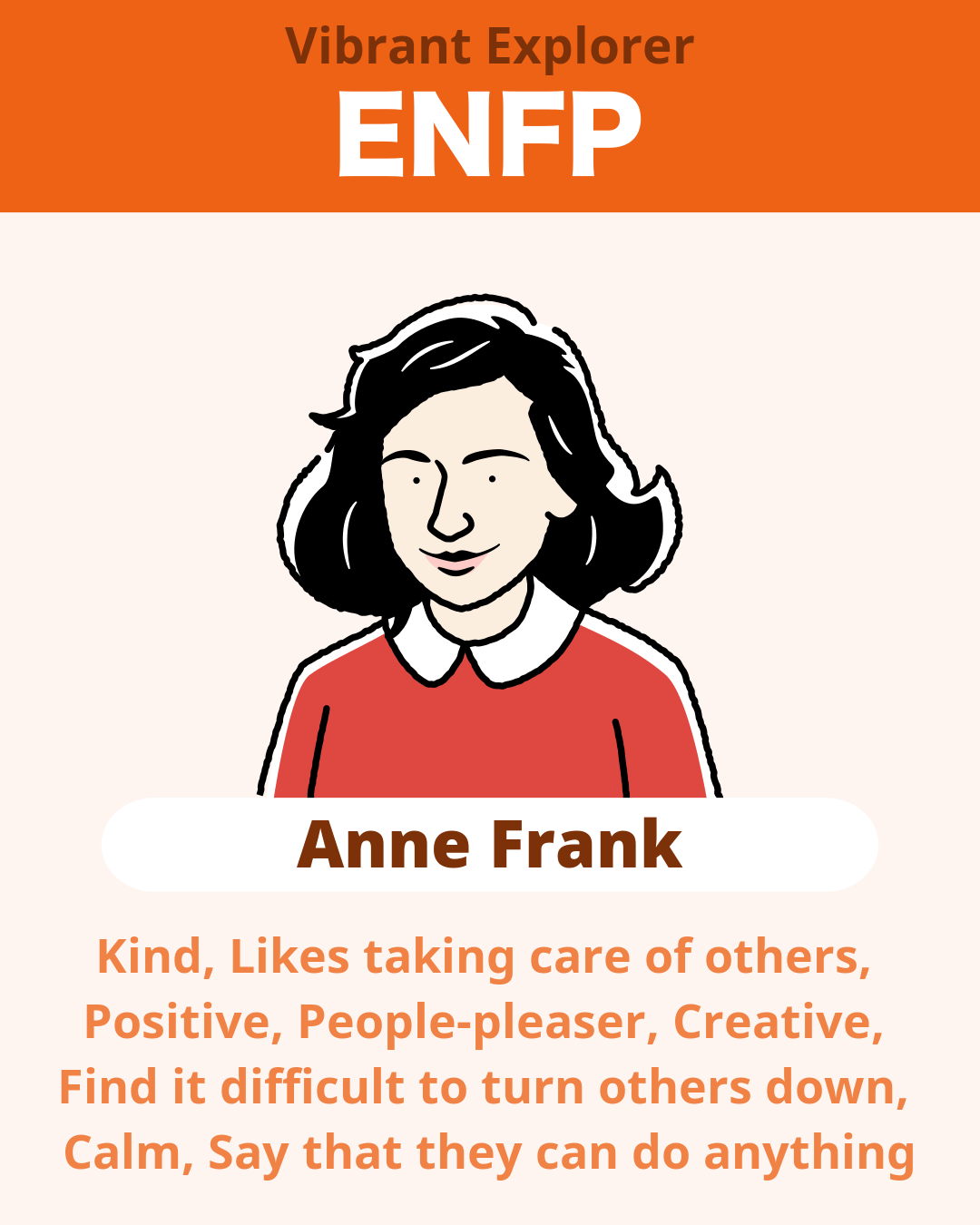
People with the ENFP personality type, also known as the Campaigner personality type, are cheerful, free-spirited and extremely curious. They are natural, spontaneous, and are always open to new things and possibilities. They are good at coming up with ideas and inspirations, and act quickly without thinking too much once they have an idea. ENFPs are compassionate, reaches out to those in need, and can get along with anyone. However, they are not good at repetitive, routine work and are not the type to keep plugging away at such work, as they tend to get bored and stop after an extended period of time. ENFPs have a lot of things they want to do, and they should take care not to take on too many things at once, as they can end up losing control.





| Ranks | Types | % | |
|---|---|---|---|
| 1 | INFP | Vincent van Gogh | 13% |
| 2 | ENFP | Anne Frank★ | 11% |
| 3 | ISFP | Mozart | 8% |
| 4 | INTP | Albert Einstein | 8% |
| 5 | INFJ | Nightingale | 8% |
| 6 | ESFJ | Andrew Carnegie | 7% |
| 7 | ISFJ | Mother Teresa | 7% |
| 8 | ESFP | Marie Antoinette | 6% |
| 9 | ENTP | Thomas Edison | 6% |
| 10 | ENFJ | Joan of Arc | 5% |
| 11 | ISTJ | Sigmund Freud | 4% |
| 12 | ISTP | Spartacus | 4% |
| 13 | INTJ | Leonardo da Vinci | 4% |
| 14 | ESTJ | George Washington | 3% |
| 15 | ESTP | Columbus | 3% |
| 16 | ENTJ | Napoleon | 3% |
They show how people think, feel, and act by giving information about their thoughts, preferences, and actions. The ENFP, also called The Campaigner, has a lot of energy that gets people going. Let's find out more about ENFP's good points and bad points.
Based on Carl Jung's work, Katharine Cook Briggs and Isabel Briggs Meyers, both from the United States, developed the 16 basic personality types. Some other theories of personality, like Socionics as well as the Keirsey Temperament Sorter, also use the basic MBTI personality types. Because of this, various personality tests and systems use acronyms like ENFP.
The "E" in ENFP is extroversion, meaning you get most of your mental focus and energy from being around others. Extroverts get their energy from doing things, attending events, and having many people around them. They like excitement and energy and getting people to do things. Also, when they talk about problems with other people, they often understand them better.
The N in ENFP requires you to stand for intuition, which indicates what type of details is most critical to you. Through open communication, they can find things they have in common with many people, express themselves well, and build strong relationships.
People who are intuitive pay attention to feelings and patterns and are good at working with theories, symbols, and generalizations. Intuitive people learn by giving things some thought. They are more interested in the future and different possibilities than in the details of the present moment.
The F in ENFP stands for feeling, which is how you like to make decisions. A person with a feeling personality type decides what to do based on their feelings about the situation and the people involved. They think about all the different points of view and seek out decisions that make everyone happy and keep the peace.
The "P" in ENFP stands for perceiving, which is how you act on the outside and how you like to be seen by others. Discerning person tries to understand the world around them and adapt to it in a flexible and friendly way.
They do things on the spot, are willing to try new things, and are eager to learn. The ENFP personality as a whole is a creative motivator. They are open to big ideas and possess much energy that helps others get inspired and motivated.
ENFPs are called "Campaigners" because their positive energy spreads and excites others about a shared goal. Campaigners are among the most popular personality types because they are naturally friendly and open, making it easy to make friends wherever they go.
Our favorite celebrities and many of history's most interesting fictional characters have ENFP personalities. ENFPs comprise about 8.1% of the general population, but 9.7% of women are ENFPs, making them the most common personality type.
ENFPs have a magnetic personality that makes it easy to make friends and build relationships. They also have inspiring and motivating energy. The ENFP's main strengths are:
The ENFP is interested in almost everything and has an open mind. They are eager to learn, try new things, and get new ideas. They are naturally interested in other people's experiences and points of view, which assist them in connecting with them.
The ENFP's intuition and perception create them very sensitive to the emotions and knowledge of others. This enables them to understand and respond to small changes in energy and emotion. Also, because they are kind and caring, they can understand and connect deeply to how other people feel.
An ENFP gets excited about plans and ideas, wants to tell everyone about them, and helps others feel the same way. They are just as excited about other people's ideas, projects, and activities as they are about their own, and they can cheer and lead.
One of an ENFP's best qualities is probably how well they can talk to people. They are great communicators because of how sensitive and caring they are and how interested they are in other people. Through open communication, they can find things they have in common with many people, express themselves well, and build strong relationships.
ENFPs are friendly and good-natured by nature. They like peace and fun, and they get along well with others and don't start fights that aren't necessary. Also, they are easy to get along with because they can find something interesting and fun even with people or things they don't like.
Based on the ENFP's personality and strengths, you might already be able to guess some of their weaknesses. Here are a few bad things about being an ENFP:
Since ENFPs like to maintain their plans casually and open-ended and are typically more curious about the subsequent big thing, their everyday lives can be messy and lack follow-through. Because of this, they tend to put off chores or not follow through on long-term objectives and plans, which can cause them stress or disappointment.
Because ENFPs are so sensitive, they can be too sensitive and think too much. They might think about a slight change in facial expression, the phrasing of a text message, or some other small thing for hours, even if it wasn't that important.
ENFPs love new projects, activities, and people because they are exciting and energetic. They often put off chores or don't follow through on long-term plans and goals, which can cause them stress or disappointment. But they may quickly lose interest in projects or activities they are already working on and start doing new things.
An ENFP always looks for the best in people and puts their energy into things that are fun and good for them. Without a healthy dose of realism, this can make them too trusting in other people or too optimistic about the results of their actions. They might try to avoid facing reality because they are unwilling to accept unpleasant truths.
The ENFP is often too eager to please others when these things come together. They like other people and want to be liked, which means they frequently give too much of themself or work too hard to make other people happy without getting anything in return.
Also, their good nature, generosity, and optimism make it difficult for them to see when people are taking advantage of them and start making them hesitant, to be honest when it might cause trouble.
ENFPs are often drawn to work in areas like helping others, improving themselves, and making art. But, in general, ENFPs don't like jobs that require a lot of thinking and focusing alone, like many jobs in evaluation, engineering, and science.
Instead, ENFPs must look for work that takes full advantage of their great communication skills, includes people and collaboration, different tasks and challenges, and the chance to be creative and original. Some of the best jobs for ENFPs that play to their strengths are:
To shine as an ENFP, you must find work, relationships, and a way of life that supports your many strengths. Most ENFPs have to learn how to understand, accept, and express their negative emotions to grow as people.
The ENFP's desire to stifle negative feelings to keep the peace and get along with everyone can lead them to bad situations or negative people, let them hold onto anger or grudges against other people, or lead them to try to stifle their feelings with drugs or alcohol. Talk therapy might help, and it takes advantage of the ENFP's natural ability to get along with others.
Still, ENFPs should balance their extroverted and intuitive power with some introverted research. Keeping a diary for 5 minutes daily may give the ENFP a good outlet for expressing and exploring their thoughts, providing them greater insight into their unpleasant emotions without exposing them to the interpersonal confrontation they dread.
People think ENFPs are old souls naturally drawn to real and artistic expression. They believe that life is meant to be lived fully and creatively and that self-expression and individual freedom are very important. Campaigners can be interested in many things, like activities involving creativity, learning, great company, and helping others.
Students with the ENFP personality type may find it hard to decide on a college major that fits their versatility and wide range of interests. Other Extraverted Intuition (EN) personality types also strongly need to try different things and are very curious.
ENFPs often need to try many things and get much life experience in many fields before they find their passion. But Campaigners can be happy in many jobs and careers, even if they don't choose the "right" college major, job, or career.
People think that ENFPs are smart, creative, and good with people. Most ENFPs won't settle for a job or career that doesn't give them what they want. Most people would rather make less money but do what they love than make more money but do work they don't like. Money is not what drives ENFPs the most.
The Campaigner makes friends and fans with warmth, kindness, and enthusiasm wherever they go. ENFP is a dynamic, friendly, and interesting personality type because of its strengths and weaknesses. If you're fresh to the MBTI and personality types, starting with a summary of the different types and what they mean can be helpful. You might want to learn what kind of person you are by taking a test online.